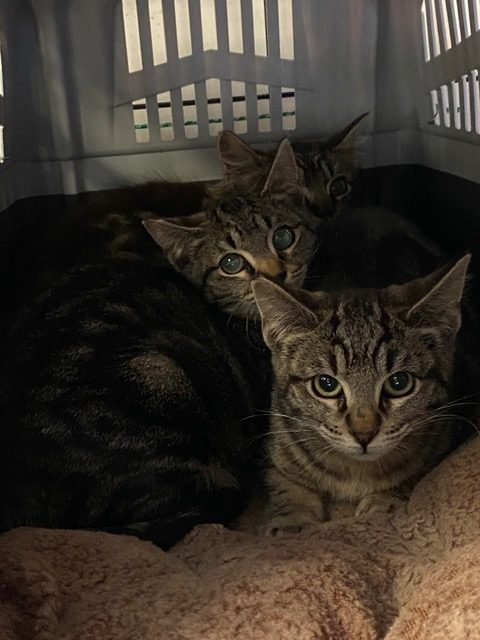
I’ve never been a fan of cats on a sheep ranch, because cats can carry toxoplasmosis, which causes still-births in sheep. But rodents carry disease too, and our barns have become over-run with rats and mice in the years since we rid the ranch of cats. So….meet our new feline friends, three feral kittens brought to us by Marin Friends of Ferals.
The kittens were trapped by the feral cat rescue program. They were in a hard-luck situation, a property that was overrun with feral cats who were practically starving. These kittens–two girls and a boy, all from the same litter– were small for their age, but scrappy. After being neutered and receiving their vaccinations, they came to us.
Janet, who runs Marin Friends of Ferals, has a great system that she has worked out after re-homing more than 900 feral cats, with greater than 90% success. The cats will stay for three weeks in a “kitty condo,” a cage on a table in our barn. It has a litter box, food bowls, toys, and two hidey places-kennels where the kitties can go and feel safe. For the first few days it is also covered with towels to keep things dark inside. We will clean the litter box and water and feed the kitties each day, and ring a bell she we feed them so they associate the bell with food.
The purpose of the three-week confinement is to give the cats a chance to get accustomed to the sights and sounds of our barn, and to all of us. When we feed them we talk to them, and when we look at them, we blink our eyes slowly, a sign that we are not predators. When they blink their eyes slowly back at us, that will mean they are becoming comfortable with us.
At the end of three weeks they will be released in our barn, and Janet will set up a game camera pointed at their food, to make sure they are coming to eat every night and other critters are not getting their food.
Eventually, when they have become comfortable in their new home, we will use the bell conditioning to shift them to being fed in late afternoon, so we can pick up the food at night and minimize the risk that other varmints will eat it.
Janet said it is important that we feed the cats; that is what will keep them happy, healthy, and keep them around. The notion that you have to starve barn cats to get them to hunt rodents is false, she says. They hunt rodents because that is what they do. And if they aren’t starving, they may not eat them, which means they will be less likely to pick up toxoplasmosis.
Janet views her re-homed ferals as cats with a career, to help humans in their battle to control rodent infestations. We are so happy to have these cats and have so much gratitude and respect for how Janet runs her cat rescue.
